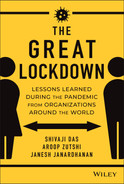CHAPTER 8
GOGOX
By Steven Lam (Cofounder and CEO) and Eugene Lee (COO)
About GOGOX
Established in 2013, GOGOX is the first app-based logistics platform in Asia committed to providing extensive logistics services through innovative technology. Formerly known as GOGOVAN, the company has a competitive and diverse business portfolio, from van-hailing and instant delivery to customized logistics solutions. GOGOX instantly connects individuals and businesses with millions of logistics partners to fulfill all sorts of delivery needs, redefining the delivery experience by providing speedy, agile, and convenient logistics services that are unmatched. Over the years, GOGOX has expanded its businesses from Hong Kong to Singapore, Taiwan, Mainland China, South Korea, India, and Vietnam.
Backdrop
When COVID-19 first emerged, it appeared mainly in Asia. But within a couple of months, it had spread across the globe, becoming a pandemic that brought the world to a halt. People were told not to leave their homes; cities went into lockdown and country borders were closed. However, as a technology-based logistics company, stopping is exactly the opposite of what we do at GOGOX.
Founded in 2013, GOGOX is the first app-based logistics platform in the Asia-Pacific region. The company started from our first business, Boxful, a lunchbox advertisement company. As that business was operating, we quickly learned that logistics services in Hong Kong were unconsolidated and inefficient. They lacked any type of operational infrastructure, and pricing was obscure. Despite all the challenges, we saw great potential in the logistics industry, which led to the establishment of GOGOVAN, our brand for the next seven years. In 2020, we rebranded to GOGOX to better represent our increased suite of logistics services and solutions.
In the beginning, we offered a van-hailing platform that instantly connected users with our logistics partners in Hong Kong via our mobile application. But we soon realized that our hometown was not our only market. As pioneers aiming to unleash the untapped potential of the logistics industry, we set our sights on conquering the entire Southeast Asia market. Over the years, we have expanded our business to Singapore, Taiwan, South Korea, India, Vietnam, and China. Today, we offer an extensive service portfolio, from van-hailing and instant delivery to customized logistics solutions, covering more than three hundred cities and eight million registered drivers under our network.
In under ten years, our small logistics business has grown to be proudly known as Hong Kong's first unicorn startup. However, would this distinction be enough to serve as our armor and protect us in the battle against COVID-19?
First Signs of COVID-19
We were on a management trip in Yilan, Taiwan, on January 11, 2020. Although COVID-19 was already in the news, it didn't cause us too much concern because everything around us was normal. We thought the situation would be like the previous Middle East respiratory syndrome (MERS) outbreak in Korea in 2015, alarming but controllable. Even when Steven flew to Switzerland to attend the World Economic Forum, COVID-19 wasn't anywhere on the agenda.
However, when we returned to Hong Kong, we experienced a completely different dynamic. Confirmed cases of COVID-19 were increasing and more people in the city started to wear face masks, reminiscent of the troubling severe acute respiratory syndrome (SARS) outbreak in 2003. On February 9, 2020, Hong Kong officially entered its first wave of COVID-19, and throughout the month, parts of China were placed in lockdown, and drivers were unable to return home. We began to sense that COVID-19 was something completely different from what we had initially thought.
There was one particular moment where the severity of the situation really hit us — we had a zero-completion rate for deliveries in China. We were overwhelmed by this unexampled figure. China is our largest market, and if that zero figure lasted for longer than a week, we wouldn't have a business to run. The fear grew as we started to worry if our other markets would also hit zero completion rates.
Navigating the Great Lockdown
It was terrifying to see how quickly COVID-19 spread across the world. Every day, our markets around Asia were seeing increasing numbers of confirmed cases. However, our #growordie company culture empowered us to strive through the challenges.
In early February 2020, we held a town hall meeting with all markets, where we presented the ugly truth — the dissatisfying business numbers and our operational concerns. We believe that transparency is key to crisis management, and as the CEO of the company, Steven wanted to ensure everyone knew that he would stay and overcome any challenges with them side by side.
We are a family of 2,000 staff members across Asia, and we knew that our members have families to support and children to raise. We had to make them feel safe and let them know that they were being taken care of, especially during this difficult time. It was inevitable that we had to execute cost control, and as the captain, Steven stepped up and announced that he would only take one dollar as his salary. Then he asked the leadership team to undergo a pay cut as well. It was not an easy decision, but it was the right one. These initiatives and the quick rebound of our China market bought us some time to buckle down to revise our strategies and sufficiently prepare for this unprecedented journey.
When you are at war, it is advantageous to have a centralized command center and choose the right battleground to start the fight. Hong Kong was our most resourceful and mature market, so it made sense for us to navigate the storm from the location we were most familiar with.
Hong Kong is a very interesting market. Things are always happening in the city, and people change very quickly. We observed two very particular transformations in Hong Kong during the pandemic: the surge of home delivery and the reduced digital divide. These changes exponentially grew our business's potential, particularly GOGODelivery, a door-to-door same-day delivery service, and GOGOBusiness, which specializes in providing logistics solutions to small and medium-sized enterprises (SMEs). Compared to 2019, we recorded a 200% year-on-year growth in new user registrations, while service demand from market segments, specifically public administration and defense as well as accommodation and food service activities, increased 152% and 122%, respectively.
During the first wave of COVID-19, Hong Kong saw a shortage of face masks, and people were very concerned about safety while leaving their homes. In response, we quickly launched a proxy buying service under GOGODelivery, offering a hassle-free shopping and delivery experience for users and encouraging them to stay home. Proxy buying caters to all sorts of daily needs, from grocery shopping and buying household essentials to food delivery. This service's magic is that it goes beyond the Internet, helping to reach local shops with little to no online presence. Our users can place orders for what they need from any shop, and our drivers will go buy it for them and deliver it to their doorsteps. The new feature was enthusiastically welcomed by the public, as we saw sharp increases in new user acquisition, order numbers, and brand awareness.
In March 2020, Hong Kong recorded the second wave of the outbreak. To facilitate the Centre for Health Protection (CHP) health check arrangements and increase the efficiency and speed of sample collection, we introduced a door-to-door saliva specimen pick-up service for inbound travelers and those placed in quarantine. Although we offered the service at cost, this initiative was able to reach more than 30,000 new users, and we had the great potential to turn them into loyal users. We soon expanded the service to all private clinics, laboratories, and private hospitals, penetrating into the new e-health market.
Extending our expertise to helping the local community was something we needed to and were honored to do. Nonprofit organizations, underprivileged families, and disabled individuals throughout Hong Kong were having difficulties getting face masks and sanitizing product supplies. We organized many community events to collect donations of these supplies from the public. Thousands of masks were received and redistributed to families and organizations in need of them, lighting up their dark times with love and care.
The Logistics Flywheel
The milestones we achieved in Hong Kong provided a shot of confidence to our other markets and showed them a path to move forward through this tough time. It also gave us the motivation to take on the bigger challenge: the e-commerce segment.
COVID-19 has accelerated the development of business transformation as companies urgently have felt the need to embrace the digital world. We are not talking about having a simple website; the new era of e-commerce requires a more advanced business infrastructure and agile end-to-end logistics solutions.
In our opinion, the pandemic has expedited the adoption of e-commerce by three years, particularly in the Southeast Asia (SEA) region. The online population grew tremendously in 2020, with 400 million new users joining the Internet; 70% of SEA's population now has access to the Internet.1 E-commerce is expected to be a core segment to unlock because 90% of online users are likely to keep their online habits post-pandemic, a segment that's worth several billion dollars.
The role of logistics is no longer confined to delivering a package from one place to another. It should now act as a flywheel,2 facilitating e-commerce evolution and transforming into a business solution that empowers businesses to capture and unleash the value and potential of the digital world. The flywheel effect was introduced by Jim Collins in 2001 and serves as an analogy to describe the process of using the right strategy to lift a heavy wheel and keep it rolling toward greater success. For us, the rapid rise of e-commerce is the flywheel that will drive the logistics industry forward. (See Figure 8.1.)
To assist local SMEs, we offer a more complex range of logistics solutions that meet the needs of businesses of different scales in different markets. GOGOBusiness provides companies with the highest level of logistics efficiency. From dedicated customer team service and routing optimization to driver management, the order cycle is completed on the same day with affordable costs.
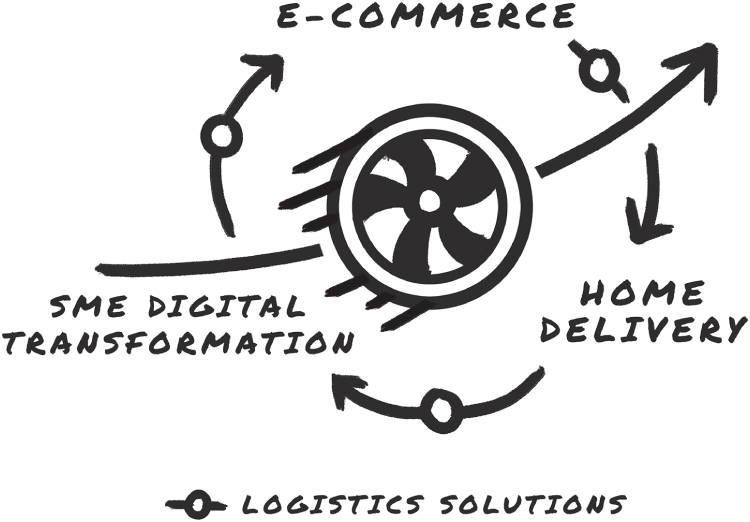
FIGURE 8.1 The flywheel effect.
In Taiwan, we launched fulfillment services, supporting marketplaces, and chain-brand companies with a range of services from storage to shipping, going beyond simple delivery. Our team in Korea focused on the retail trade industry and achieved 62% year-on-year growth in terms of order volume.
Meanwhile, social distancing measures in Seoul contributed to a 130% increase in ad-hoc delivery order requests. In Singapore, we have witnessed a significant surge in business delivery and recorded a fivefold increase in new users, in which accommodation and food service activities had the highest service request, with over a 300% year-on-year growth. The swiftly revised strategies in our other markets empowered us to capture market needs according to the rapidly developing COVID-19 situations and ongoing changes in local government policies.
The strategy to tackle the SME market has always been about value, delivering extra product benefits that contribute to better efficiency. COVID-19 has challenged us but also reinforced another part of our company's ethos, #Daretoventure. We have become more than a last-mile delivery company, evolving into a multifaceted, technology-led logistics company that offers agile and efficient logistics solutions.
In addition to business performance, the safety of our users and logistics partners has always been a top priority in our daily operations. We rolled out global safety measures to enhance the service level to be as safe as possible for both users and logistics partners. At our Hong Kong headquarters, we provided an income protection scheme to couriers who participated in the door-to-door saliva specimen delivery initiative, as well as free life insurance coverage to all logistics partners and their families, hoping to offer them a more protected work environment with extra benefits. (See Figure 8.2.)
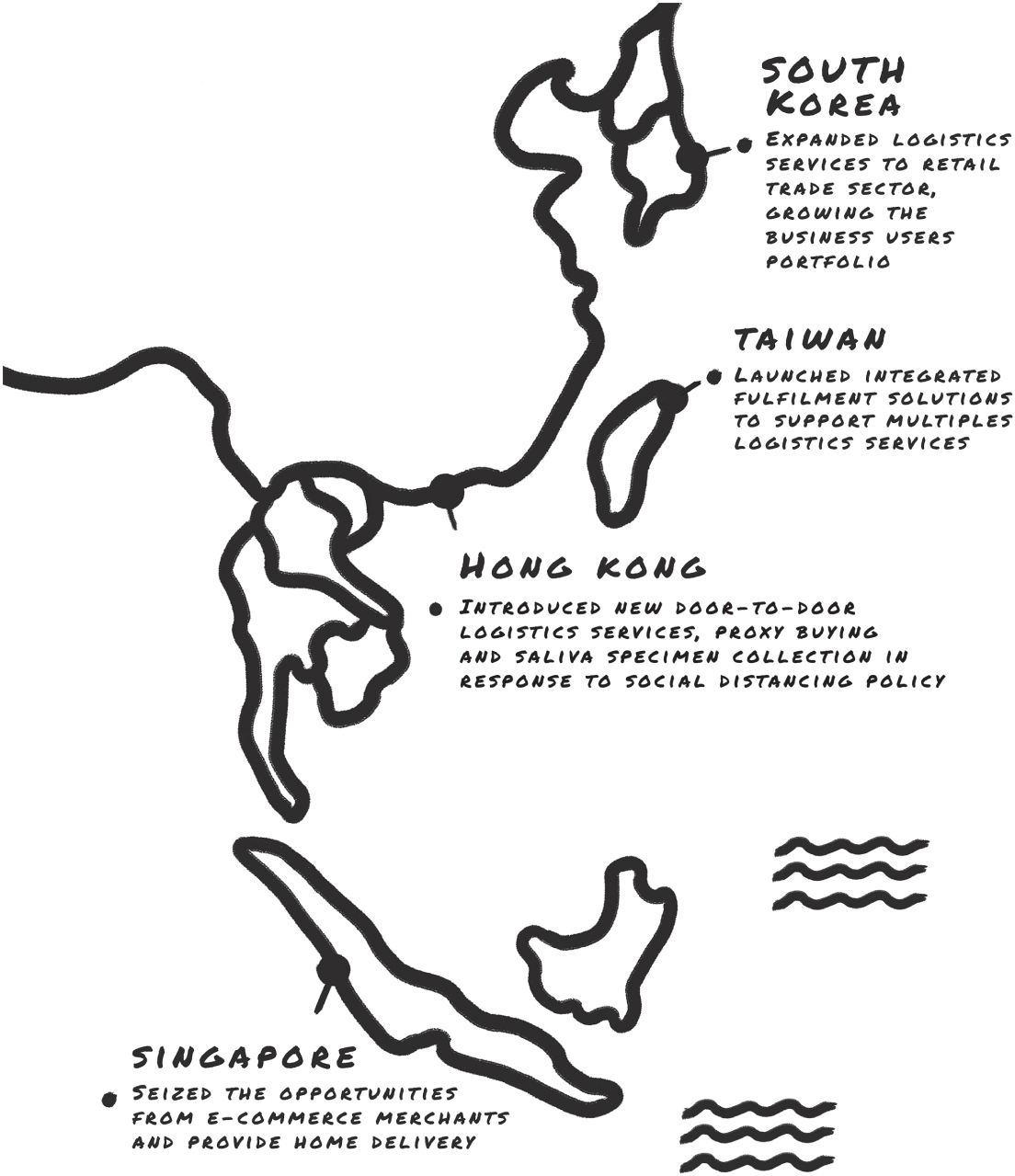
FIGURE 8.2 In addition to business performance, safety is a top priority.
People Management in the New Normal
Running a business is tough, but managing people is an even more arduous task, especially in the new normal.
One interesting fact about our company is that three of our four founders were fresh graduates when they started the business. When there were fewer than ten employees in the company, things were pretty straightforward. Today we have a great talent team to take care of the thousands of staff we have, and COVID-19 presented us with some bumps in the road. We are a very young company with intelligent and dedicated employees who are mostly millennials and Generation Z. We spared no effort in ensuring a safe working environment for every member of our team in the pandemic. We executed work-from-home procedures and provided face masks and sanitization necessities to all essential employees. But we knew these efforts alone weren't enough. (See Figure 8.3.)
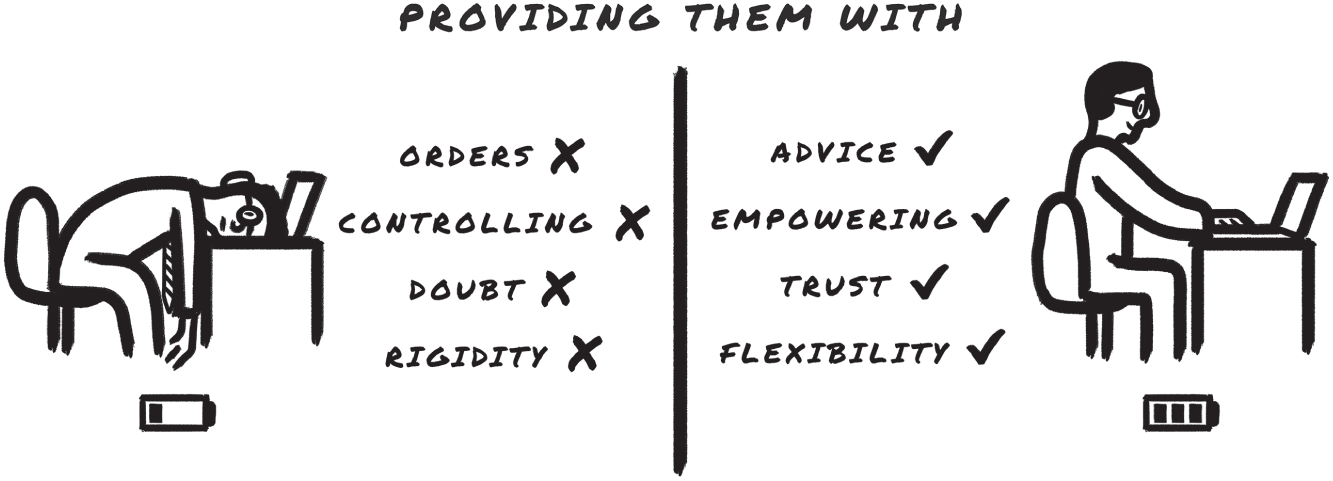
FIGURE 8.3 A safe working environment was essential for all employees.
Fairness was the first issue we had to address at a very early stage. Like many companies, we have departments that work in shifts, and the nature of some departments makes it extremely difficult to work remotely. Our customer service team, business team, and finance department went back to the office regularly to keep the wheels rolling, while other teams were able to work from home. Although no one spoke out about it, we felt the need to address this. The founders and department leaders would go back to the office whenever they could to work alongside those departments, indirectly expressing their gratitude for their dedication to the company.
Engaging with those working remotely was a completely different challenge. In Asia, the home office concept is relatively new; although some employees were excited at the work-from-home policy, others were not as fond of it. Within a few weeks, we noticed that work efficiency began to drop and engagement became weaker and sparser. We tried to introduce a timesheet exercise to keep track of work efficiency. However, we quickly realized it wasn't the right tactic because it brought up questions around micromanagement and trust. One of the lessons learned from working with the younger generation is always ensuring that they feel valued and respected, offering them advice instead of presenting orders, and empowering them whenever possible but not controlling them. Therefore, we decided to invite all middle managers to be more involved in strategic meetings, giving them more visibility on the business. Most importantly, they were tasked to improvise according to the market's lockdown situation and company strategies. We provided them with trust and the flexibility to lead and execute as they see fit, and in return, teams became more engaged.
Also, our employees’ mental health is something we take very seriously, so we decided to ensure that our office was always available if any employee chose to work there instead of at home. When they worked from home, we made sure they were not working excessively, striking a healthy work-life balance.
From a management perspective, our leadership team was also having a hard time maintaining good communication. Conversations became cold; the team was distant, and members of management within markets and teams were worried. Sometimes doing business is more than just revenue. Creating and embodying the values your team believes in is much more important, particularly in dark times like this. It took many in-depth chats and genuine understanding to rebuild the connection.
What We Learned from COVID-19
Platform and sharing economies have greatly disrupted the way we live and do business. Over the past decade, we have been fascinated with the new economy, but COVID-19 has shaken things up and led us to rethink our strategy.
Our management philosophy has always been “Imagine for ten years, plan for five years, action plan for three years, execute it in one year,” but COVID-19 was never in the picture. We know it's cliché to ask “what if,” but what if there was no pandemic? Generally, we believe the digital surge and business transformation would have happened at a much slower pace, investing more time in educating people on the value of logistics. If everything went as planned, 2020 was the year for our international growth, building our Korean market to become the second Hong Kong, our second-most profitable market. However, there aren't any what-ifs in real life. Instead, the pandemic has taught us just how important it is to build a business that can resist any uncertainties, big or small.
Like many other startups, we used to chase after aggressive expansion, valuing something that looks good on paper over our business's long-term quality. One of the amendments we made during COVID-19 was to rectify our mentality and search for better business efficiency, growing the company in a healthier and more sustainable way with a strong foundation that can stand up against any kinds of black swans in the future.
Reverse Engineering
Over a period of 18 months, we reversed our approach and shifted our focus to the fundamentals — our product, our people, and our brand. At the product level, we put more time and resources into our products as our investment in the future. We migrated our seven-year-old app server infrastructure from a basketball court to an airfield, providing ourselves with better grounds for greater achievement. Also, we launched our integrated API suite and unlocked agile seamless logistics integration for businesses of all sizes. The product and engineering transformation set a more robust infrastructure for us to scale up and execute our new “flywheels” at a much faster speed. (See Figure 8.4.)
Besides upgrading our products, we also worked with our team to make sure they comprehend the challenges ahead in the new normal and to tackle them with the right characteristics and beliefs. Back in 2013, we created three company values — #nobullshit, #noevil, and #daretoventure. After seven years and much growth, we decided to refresh the culture we embody to better respond to the world today.
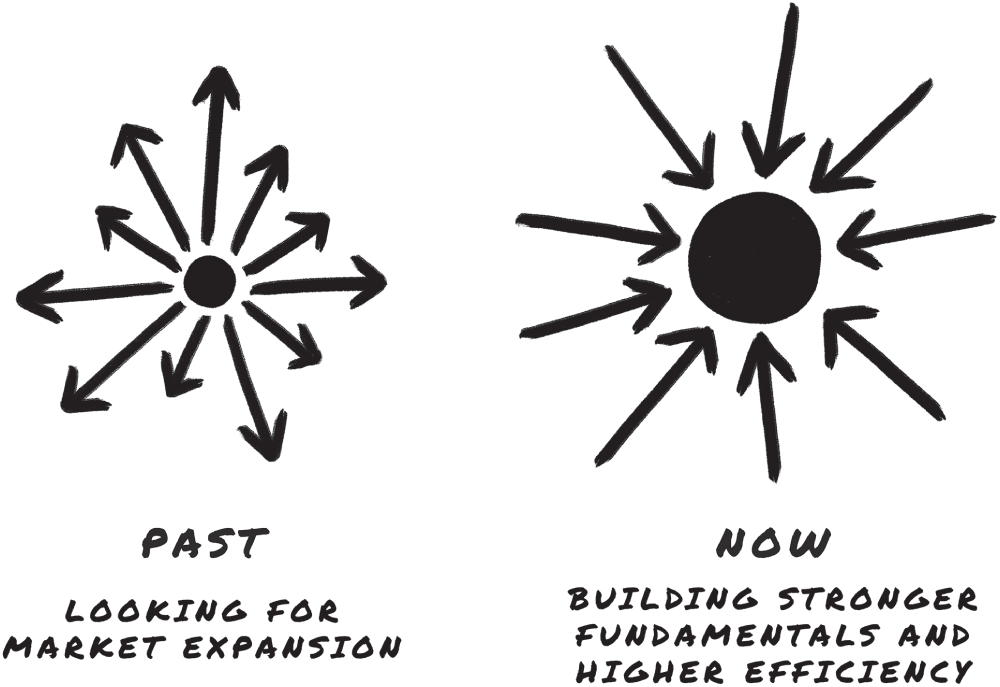
FIGURE 8.4 The new flywheels.
Our company's DNA doesn't come from founders and senior management but from our managers and juniors who demonstrate our standards and values throughout their work and the daily interaction with users, driver-partners, and the community. We formed an Employee Engagement Team and invited members across markets and teams to discuss the characteristics we exemplify daily and the culture we want to build for the future. It helped us understand more about the type of company our employees enjoy working at and how we might get there.
Today, we are a company that values #nobullshit and #daretoventure and embraces the culture of #topofyourgame, #growordie, and #deliverhappiness. With stronger products and people, we wanted to let the world know that we are ready for the challenges and opportunities that the future will bring. So, we rebranded.
GOGOVAN was who we were for seven years. But we bid the brand farewell on July 8, 2020, as we entered the eighth year of our journey, with new branding as a celebration of how far we have evolved. GOGOX is a new identity that symbolizes our commitment to providing eXtraordinary eXperience to individuals, business customers, and logistics partners with our eXpertise and to drive eXponential growth for enterprises with efficient logistics services and technologies. We are immensely proud of our achievements, especially when times have been tough, but we are excited to show what the newer and stronger us can deliver.
Future Outlook
Frankly speaking, we are still not out of the woods yet, but at least we are on the right track. Efficiency sits at the core of our business now; we have scaled up our products and rebranded to enable ourselves to capitalize on greater opportunities. Our marketing and growth strategy are more dedicated to enhancing the user's journey; a holistic approach is in place from activation to retention. We are aiming to build more flywheels to equip ourselves with the right DNA against any global crisis in the future. (See Figure 8.5.)
Logistics and delivery are industries that have not been accelerated over the last 20 years. The emergence of e-commerce has forced the industries to evolve to satisfy altered customer behavior. There are expectations for more advanced service levels and more instant and real-time logistics services. The development of intra-city logistics will further facilitate the adoption of e-commerce and home delivery, a more connected living infrastructure enabled by technology and data analytics.

FIGURE 8.5 The company's new identity helps define a path for the future.
The world has changed, and we have to change with it. Information will be shared seamlessly with the increasing adoption of digital technology. Consumer behavior will continue to transform and require more complex data analytics to understand. Automated vehicles and smart city development will further reshape our industry. The logistics evolution will be centered around connectivity and efficiency, requiring the traditional service to develop a new set of more agile and instantaneous solutions.
There is an interesting equation awaiting us to crack: what will the future look like when logistics is further exposed to the influence of digitalization with advanced technology such as artificial intelligence and robotics accelerating in the post-pandemic era, along with the growing influence of Generation Z?
About the Contributors

Steven Lam is the cofounder and Chief Executive Officer (CEO) of GOGOX, which was founded in 2013. He is responsible for developing the overall business strategy and driving the growth and profitability of the business across the region. Steven earned a bachelor's degree in business administration with a focus on global management from the Haas School of Business, University of California, Berkeley.

Eugene Lee is the Chief Operating Officer (COO) of GOGOX, overseeing the strategic direction and operations in GOGOX's seven markets. The combined entity is now Asia's largest logistic delivery platform. Eugene continues to chart the company's expansion plan, evolving and improving the company's operational processes, engagement, efficiency, and productivity, as GOGOX takes on its next phase of growth and progress.
Notes
- 1 Internet users in the world 2020 by Statista, https://www.statista.com/statistics/617136/digital-population-worldwide/
- 2 Jim C. Collins, Good to Great: Why Some Companies Make the Leap and Others Don't (Harper Business, 2001).
